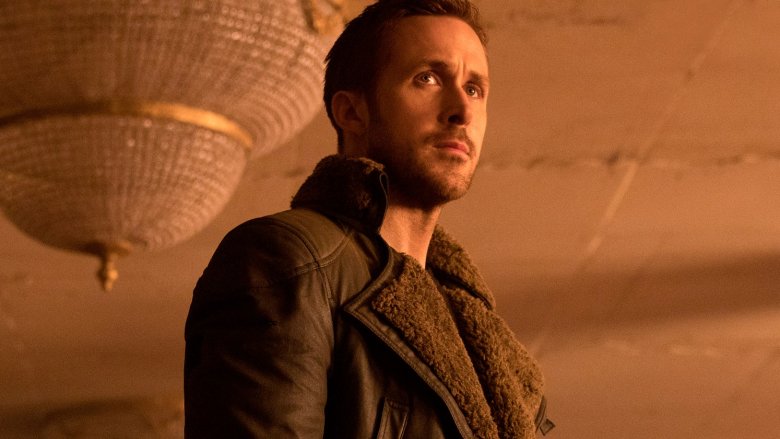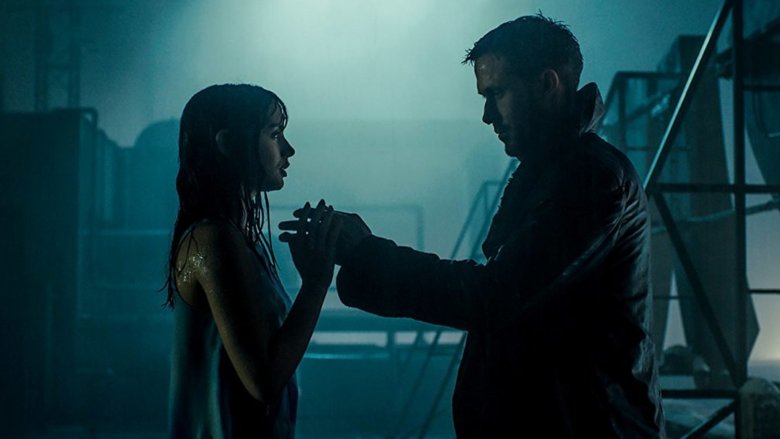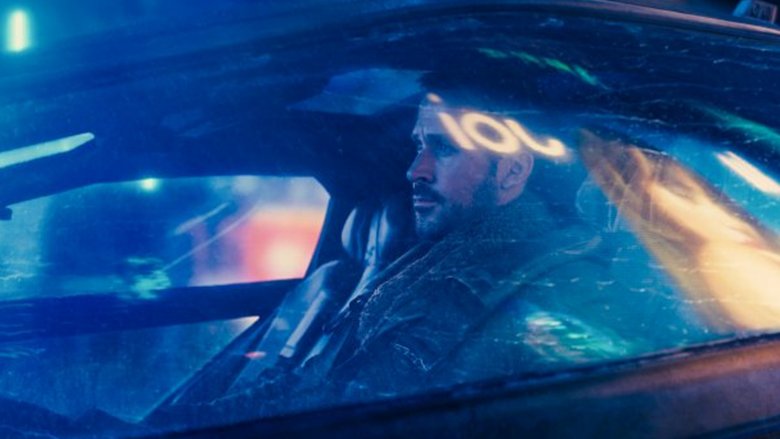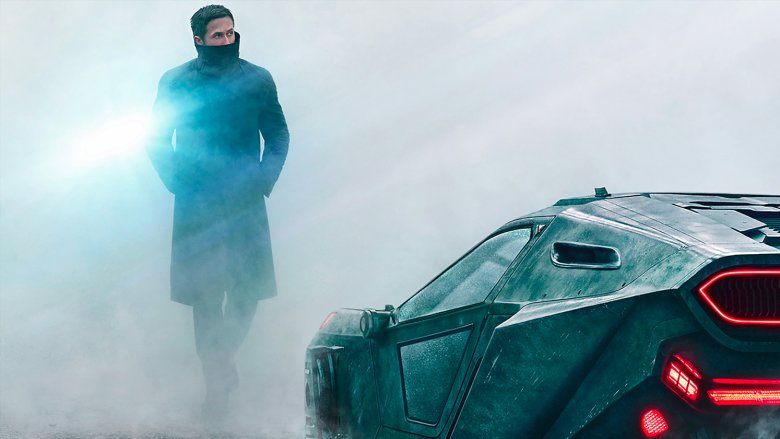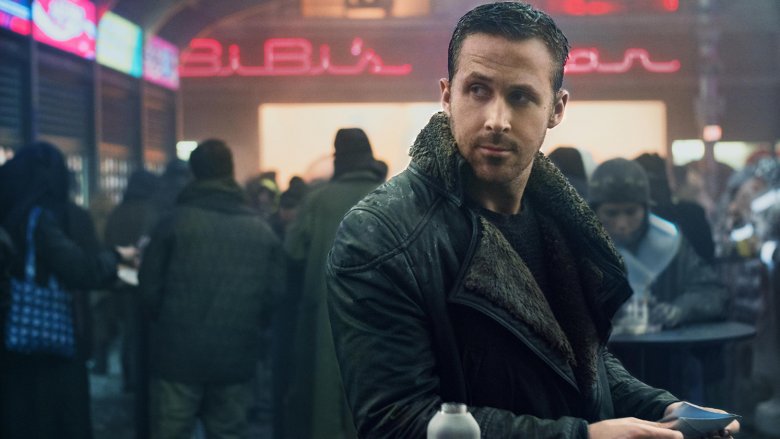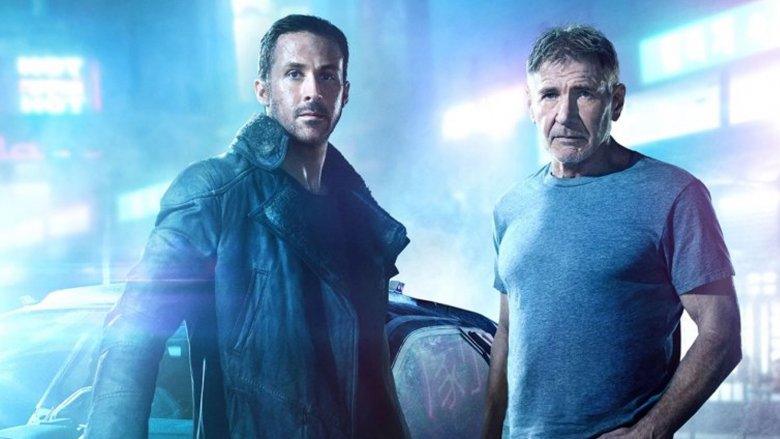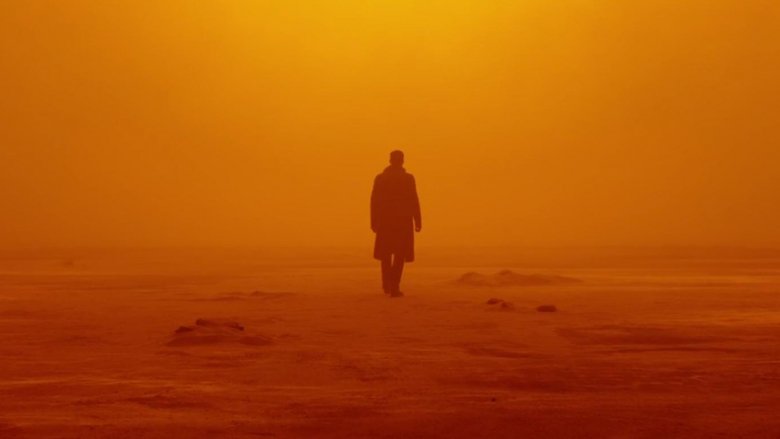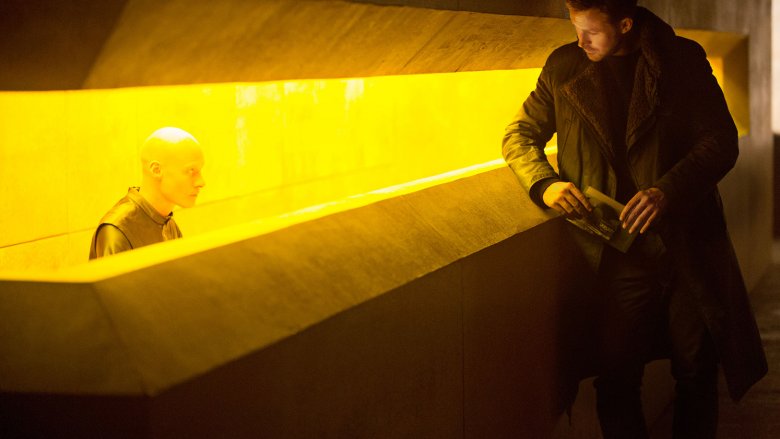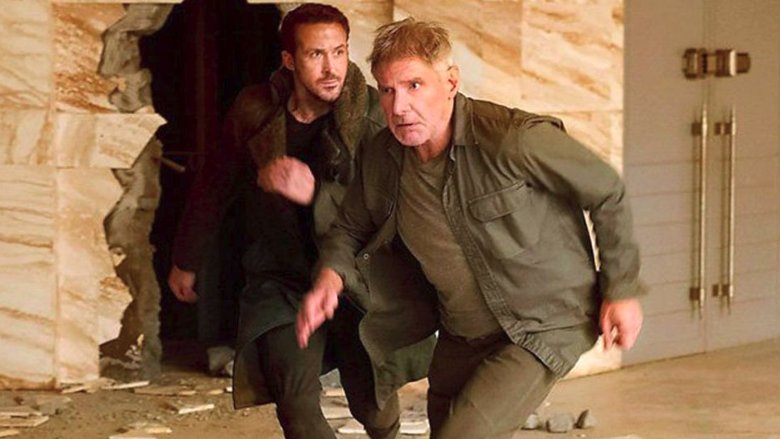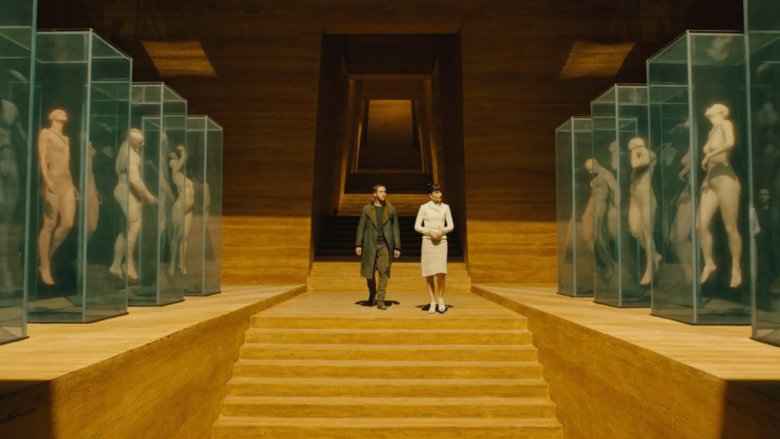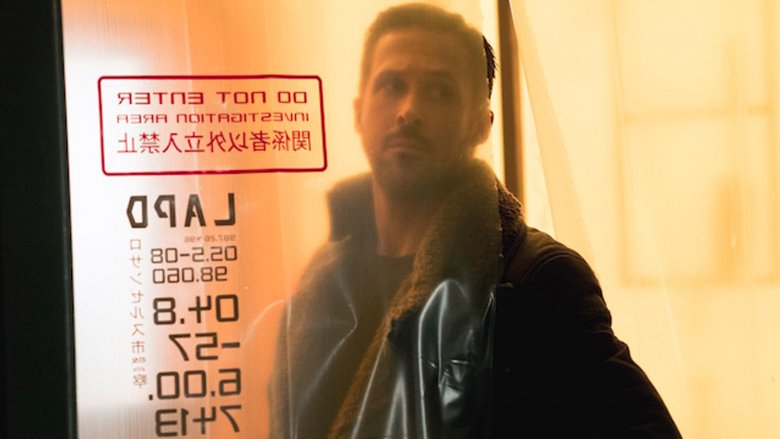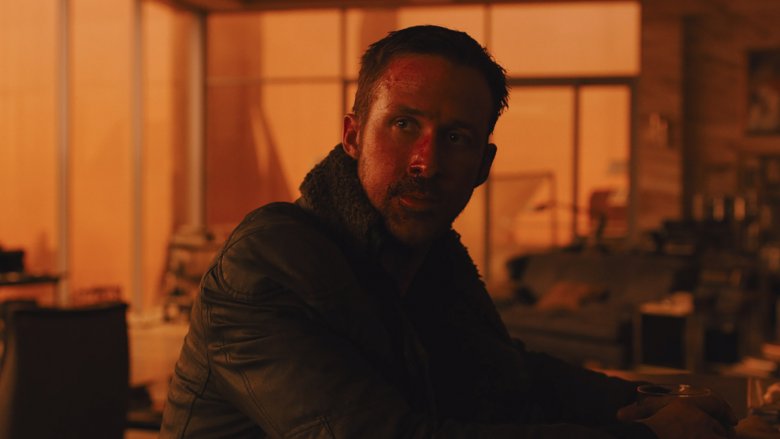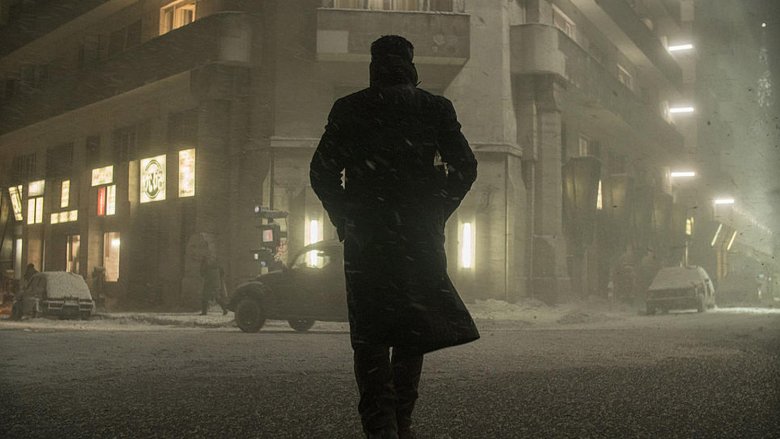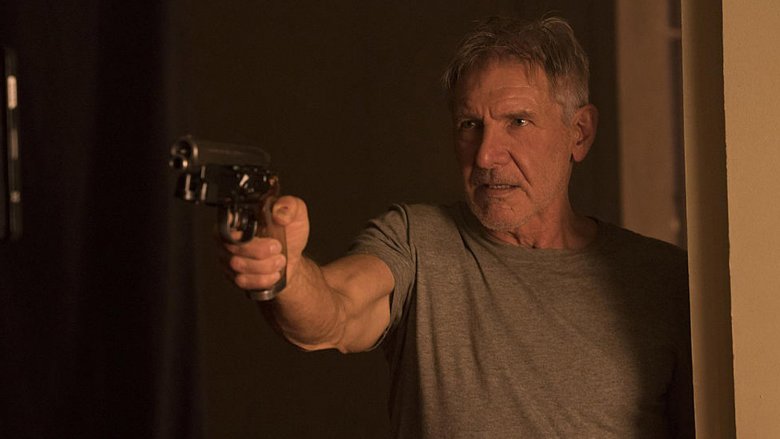What Critics Are Saying About Blade Runner 2049
With Blade Runner 2049 set to premiere in the United States on October 6, eager fans have been scouring the internet for every rumor or scrap of news they can find. The plot's been kept as quiet as possible by Warner Bros. and director Denis Villeneuve—but the review embargo finally lifted on September 29, and we've gotten our first look at what top movie critics thought of the Blade Runner sequel. It seems that even the critics were asked by the studio to keep most of the twists and details of 2049 under wraps until after the movie premieres—but so far, the reviews have been overwhelmingly positive. Here's what the critics had to say about Blade Runner 2049.
TheWrap
TheWrap critic Alonso Duralde gave the film a glowing review in which he pointed out that sequels and reboots to major film franchises often end up as merely a "cynical cash-grab or by-the-numbers repeat"—then assured readers that is most definitely not the case for Blade Runner 2049, which "manages to go deeper on the ideas offered by the first film," and "proves that this world merits repeat visits."
He explains that while "story-wise, this is your basic 'cop gets in way over his head' tale," director Denis Villeneuve and writer Hampton Fancher don't let the plot get in the way of the overall theme. Building upon Philip K. Dick's story and the original 1982 film, Blade Runner 2049 "isn't here to answer" the questions raised in the first movie about the nature of reality and artifice, but "it does take those questions to an even more thoughtful place."
Duralde goes on to summarize the movie thusly: "What is real, and what approximates reality, and what happens when the approximation confuses itself for the genuine article, is at the heart of Blade Runner 2049." He also heaps praise upon cinematographer Roger Deakins for his stunning work, and while he does believe the movie could benefit from some additional editing, Duralde proclaimed the performances of the cast were "uniformly excellent."
Village Voice
At the Village Voice, journalist and filmmaker Bilge Ebiri began his mostly positive review by pointing out that fans of the original Blade Runner would be making a mistake to use the 1982 film as a yardstick to judge the sequel by. Ebiri hails director Denis Villeneuve for taking the final moments of Ridley Scott's masterpiece (which famously contained some B-roll footage from Stanley Kubrick's The Shining) and using that sense of wonder and exploration to convincingly expand the Blade Runner universe—filling it with "frame after frame of impossible, forbidding beauty." Ebiri also praised Villeneuve and the rest of the production team for staying true to the look and feel of Scott's movie without trying to reinvent it, but still providing audiences with "something new and exceptional."
All that being said, Ebiri admits that "I didn't love this movie." His main qualms with 2049 are with how (or rather, how much) information is simply given to the audience, as "plot points have to be spelled out and themes stated over and over again, with little room left for ambiguity." Although Ebiri doesn't want to judge 2049 solely by the original Blade Runner, the sequel "insists on referencing it at every turn, choosing to replay entire subplots from its legendary forebear as mysteries to be unearthed." He wraps up his review by concluding, "Careful, dutiful, and beautiful, Blade Runner 2049 cannot achieve the sublime slipperiness of Scott's masterpiece. Whether it even needs to is up to you."
Rolling Stone
In his review for Rolling Stone, critic Peter Travers practically gushes over Blade Runner 2049, calling it an "instant classic." He also claims that even diehard Blade Runner fans like himself will surely agree that although 2049 runs 45 minutes longer than the 1982 original, "every minute of this mesmerizing mindbender is a visual feast to gorge on." Travers heaps praise upon director Denis Villeneuve for showing "a poet's eye for details that reveal emotion." When it comes to the future and legacy of the franchise, Travers believes wholeheartedly that "the Blade Runner mythos could not be in better hands."
As for the cast of the film, Travers says that Harrison Ford was "at his hard-case best" in his return as Deckard, and Ryan Gosling put in "a superb, soulful" performance as Officer K. While he didn't want to reveal too many details, Travers definitely upped the anticipation for fans by calling the first meeting between Deckard and K "double dynamite," at which point "the film takes on a resonance that is both tragic and hopeful." As he concludes, "Blade Runner 2049, on its own march to screen legend, delivers answers—and just as many new questions meant to tantalize, provoke and keep us up nights. Would you have it any other way?"
Entertainment Weekly
For Entertainment Weekly, critic Leah Greenblatt gave Blade Runner 2049 an enthusiastic A- in her review, while also taking care not to reveal too much—as "unwise reviewers could meet a bottle of chloroform in a dark alley just for disclosing what happens in the first five minutes." That being said, Greenblatt was full of praise for Villeneuve, "who faithfully retains [Ridley] Scott's dusky golds and grays and retro '80s pastiche."
Greenblatt also highlighted the performances of the supporting cast—including Robin Wright, who plays Officer K's boss "with brisk, ruthlessly tailored hauteur," Jared Leto, who revels in his role as mad genius Niander Wallace "like a fashion-model monk with cataracts," and David Bautista, who Greenblatt fondly calls "a human Humvee in coveralls and stubble" in his part as the possible-replicant, Sapper.
She does warn audiences that Villeneuve "may have fallen a little too in love with his own creation; at two hours and 40 minutes, aesthetic shock and awe eventually outpace the narrative." Despite the overlong running time, Greenblatt concludes that "every impeccably composed shot" feels like "a ravishing visual feast," and that "2049 reaches for, and finds, something remarkable: the elevation of mainstream moviemaking to high art."
The Hollywood Reporter
Over at The Hollywood Reporter, veteran movie critic Todd McCarthy gave Blade Runner 2049 a largely positive review—tempered by a warning that this "entrancingly immoderate" film is a "stylish but overlong" follow-up to Ridley Scott's 1982 classic. While 2049 manages to achieve "something very close to the same narcotic effect [of the original]...with a voluptuous mood bath that's impressively sustained from beginning to end," at 164 minutes long, it's also a prime example of "directorial excess" that could have benefitted from a little more "self-discipline" on director Denis Villeneuve's part.
Despite the over-indulgence, McCarthy praised screenwriters Hampton Fancher (who co-wrote the original Blade Runner screenplay) and Michael Green for going light on the exposition in 2049's script—allowing the themes of the film, and cinematographer Roger Deakins' "brilliant through-a-lens-darkly" visuals, do most of the talking. McCarthy cautions fans that things get "dramatically muddled and confusing" at one point, but once Harrison Ford reappears for his "ragingly physical performance" as Deckard, he "almost single-handedly amps up a film otherwise intentionally drained of character vitality."
Variety
In the reviews section at Variety, Blade Runner 2049 made the "Critic's Pick" list, with movie critic Peter Debruge hailing it in his review as a "rare sci-fi sequel that takes its time to go deep." Debruge believes the "stunningly elegant" new film will not only appeal to long-time Blade Runner fans, but also newcomers "who aren't wedded to the franchise's muddled off-screen mythology." Debruge also comments upon the length of 2049, but in contrast to some of the other critics, he feels "Villeneuve earns every second of that running time, delivering a visually breathtaking, long-fuse action movie" filled with "unconventional thrills."
In the rest of his review, Debruge continues to heap praise upon Villenuve and the rest of the production team for their "bracing vision of where humankind is headed" and the "slick, 21st-century Pinocchio story" that eventually unfolds into "a rich inquiry into the nature of the soul itself." Debruge even risked the ire of Blade Runner devotees by going out on a limb to claim that while "the original Blade Runner was (eventually) embraced for its unrealized potential, its sequel ranks as one of the great science-fiction films of all time."
Vulture
For Vulture, author and longtime critic David Edelstein does his best to "tiptoe" through Blade Runner 2049's plot in his positive but lukewarm review of the new film. Instead of getting too deep into the good, the bad, and the ugly of 2049, Edelstein instead tries to imagine what Do Androids Dream of Electric Sheep? novelist Philip K. Dick would have thought. As Edelstein points out, Dick didn't live to see Ridley Scott's movie—but Dick had seen the screenplay for Blade Runner, and offered a tongue-in-cheek approval that was shaded by more than a little irony: "What my story will become is one titanic lurid collision of androids being blown up, androids killing humans, general confusion and murder, all very exciting to watch. Makes my book seem dull by comparison."
Edelstein posits that Dick would find more to approve of in 2049, which is "little less noir, a little more philosophical" than the original. Additionally, he points out that one supporting character (played by Carla Juri) in 2049 has origins that are rooted firmly in Dick's world. That being said, Edelstein also believes that "Dick probably wouldn't have liked the film's heavy dose of sentimentality, especially the ending, which is also unsatisfying." To sum up, while he thinks "most audiences will like the film," David Edelstein rates Blade Runner 2049 as simply "okay."
Nerdist
At Nerdist, critic Kyle Anderson admits in his review that he came late to the Blade Runner universe—not discovering the film or exploring its many different cuts until he was in college. Before seeing 2049, Anderson wondered if it was possible for any Blade Runner sequel to hold its own against the original. His answer is a definite "yes"—telling readers that 2049 "smartly enriches what we'd already seen...this time channeling some of its larger themes through character for a more personal experience."
Anderson goes on to say that "the cast, top-to-bottom, is phenomenal," and soothes worried fans with a reassurance that "Gosling's Officer K is just as magnetic as Ford." Unlike other critics who wearied of Blade Runner 2049's long runtime, Anderson says that near the end of the movie, "I thought to myself, 'Oh man, I could easily keep watching more of this.' It's a world with a lot to say, and a movie that says it in exactly the right way." Tying a bow on his review, Anderson calls 2049 "not only a brilliant sci-fi movie, but one of the best movies of the year."
Forbes
For Forbes, Scott Mendelson gives Blade Runner 2049 a rare negative review, calling it "an overlong, underwhelming sequel" that "takes forever to go nowhere special." Before we dig into the details of Mendelson's review, he brought up a good point about the budget of Blade Runner 2049—which at $185 million makes it the "biggest-budgeted R-rated movie ever." This means that if Warner Bros. wants the film to be a success, they're going to have to rely on more than nostalgia hounds and diehard fans to fill those seats.
Mendelson admits he wasn't a fan of Ridley Scott's original Blade Runner, and says 2049's "extra running time merely means a more drawn-out mystery with little urgency or momentum." He does feel the sequel offers up some "intriguing sights, low-key performances and a few interesting ideas," as well as "some admittedly jaw-dropping production design and cinematography." As Mendelson concludes, "the original Blade Runner had pioneering visuals, strong performances and superb special effects to compensate (or justify) thin characters and a thinner story." In contrast, the sequel will likely only satisfy franchise fans, because 2049 "tells a thin story in the most obtuse way possible," and "even a visual delight must justify itself in terms of story and character."
Uproxx
In his review for Uproxx, Mike Ryan hails Blade Runner 2049 as "a gorgeous return to a wearisome world." He begins his review by cautiously admitting that Ridley Scott's original Blade Runner is "a movie I certainly appreciate, but don't love...It's a movie that in theory I should love, but I just can't get there." In contrast, Ryan felt that 2049 "stuck with me in a positive way that the first one didn't," and he found himself "feeling more invested in the story than I ever was with the first movie." He mostly attributes this to Ryan Gosling's take on Officer K, which he felt offered up a much more subtle and nuanced emotional performance than Harrison Ford's approach to Rick Deckard in the original film.
In addition to what he felt were outstanding performances by the 2049 cast, Ryan claims that "cinematographer Roger Deakins has shot what is one of the most beautiful movies ever made," and concludes that even though the movie occasionally drags during its 160 minutes, it's the "little, subtle inflections that make Blade Runner 2049 a success."
CinemaBlend
At CinemaBlend, reviewer Eric Eisenberg wasn't stingy with his praise for Blade Runner 2049's "genius blend of sci-fi aesthetics blended with a dense and complex noir narrative." Eisenberg rightly points out that it took a number of years (and several re-edits) for the original to cement its cult classic status. In contrast, Eisenberg claims, Blade Runner 2049 won't have to wait to be appreciated as "a sci-fi masterpiece," because "people are going to recognize it immediately." He continues his effusive praise, stating unequivocally that "Blade Runner 2049 returns to Philip K. Dick's deep philosophical questions about the nature of humanity, and expressed through a captivating, epic mystery, it amounts to a breathtaking, mind-bending cinematic experience."
"Finding success where so many other long-awaited sequels falter, Blade Runner 2049 strikes a tremendous balance between old and new," Eisenberg continues. In particular, he calls out the strengths of the movie's flow, which "keeps everything moving" despite the "intimidating" runtime, and Roger Deakins' cinematography, which Eisenberg calls "unquestionably one of the most breathtaking big screen experiences you can have."
ScreenCrush
In his review for ScreenCrush, critic Matt Singer focuses early on the stunning cinematography of Blade Runner 2049, exclaiming, "My God, what a beautiful movie this is." He hails the sequel as "the most visually spectacular science-fiction film of the century," and even claims that "you could watch this movie with no sound and still enjoy each of the film's 163 minutes." Singer also takes the time to compare the feel of 2049 with the original: "Ridley Scott's Blade Runner was a science-fiction film that looked like a detective story. Villeneuve's Blade Runner 2049 is much more of a detective story that looks like a science-fiction film."
Additionally, Singer has nothing but good things to say about Ryan Gosling and Harrison Ford's performances. Gosling's efforts and the effective script written by Hampton Fancher and Michael Green have managed to create "a character worthy of succeeding Deckard." Speaking of Deckard, Singer claims that while he wasn't a big fan of Ford's performance in Blade Runner, the writers have given him some "meaty, emotional scenes to play" in 2049, and Ford delivers. "Whether Deckard is a replicant or not," Singer adds, "Ford brings a tremendous amount of humanity to this movie."
Chicago Tribune
At the Chicago Tribune, reviewer Michael Phillips checks in with a positive, but even-keeled take on Blade Runner 2049—one which hands out praise and criticism in equal dollops. Phillips leads off by summarizing his opinion of the sequel: "flawed, yes, flabby, yes, a little wobbly and synthetic on story. And often spellbinding." Phillips predicts that the audience response to 2049 will be mixed, and that it will likely "divide audiences just as the original did." Among the high points of the film for Phillips were the stunning visuals, in which Villeneuve and the rest of the design team created "a world indebted to the '82 film, but not chained to it."
Like many other critics, Phillips praises Roger Deakins' cinematography—opining that with 13 Academy Award nominations already under his belt, he's long overdue for a win. On the flip side, Phillips points out several flaws with the screenplay and pacing of the film—in particular, how Villeneuve "bungles the staging of a couple of key action sequences," or what Phillips calls the "water-logged climax" of the movie. All that aside, Phillips concludes that 2049 offers audiences a "brilliantly imagined visual universe," and says "A moviegoer can forgive a lot in a movie, when the movie offers so much to see."
